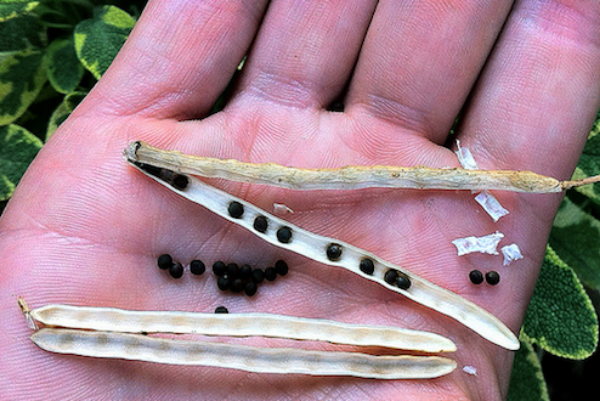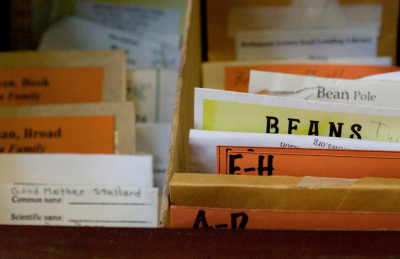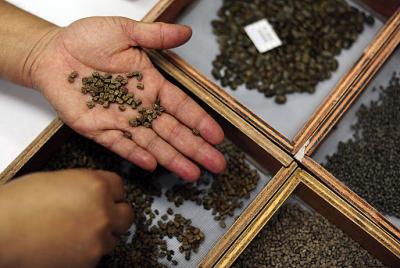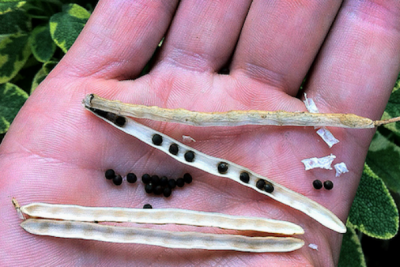
Join the Fight to Protect Local Seed Libraries
 cross-posted from Shareable
cross-posted from Shareable
In June, librarians at the Joseph T. Simpson public library in Mechanicsburg, Pennsylvania were told by state agriculture officials that their small, in-house seed library needed to comply with the state seed law. Trouble is, the law requires extensive testing designed for commercial agricultural enterprises—not neighborhood seed sharing. Being held to the same requirements as commercial seed enterprises could render seed libraries, and seed sharing in general, extinct. But the crackdown was not necessarily a bad thing.
In response to it, seed libraries around the country started mobilizing to address what they see as government overreach. And, they’re already having some success. In Duluth, Minnesota, the city council unanimously voted for a resolution supporting seed sharing in the city. The matter was taken up by state senator Roger Reinert who recently introduced a bill to the state senate recommending changes to the seed law. The Nebraska legislature is also taking up the issue this session.
Seed activists in Pennsylvania, Wisconsin, and several other states are also working on Save Seed Sharing campaigns. The focus of these campaigns is to legally separate seed sharing from commercial seed distribution and exempt seed sharing platforms, including seed libraries, from the state seed law.
Want to start a campaign to save seed sharing in your town? We’ve put together the following guide to help you do just that. Part of Shareable’s Save Seed Sharing partnership with the Sustainable Economies Law Center (SELC) and Richmond Grows Seed Lending Library, the guide takes you through the necessary steps to organize seed activists in your community and amend your state seed law to explicitly exempt seed sharing.
Connect with Your Local Seed Bank or Seed Library
Your local seed bank or seed library may already be organizing to save seed sharing. Check in with local seed librarians. If they’re not already taking action, you can use the seed library community as a foundation to start growing a local Save Seed Sharing campaign. Not sure where your local seed library is? Check the database of seed libraries.
Determine What the Seed Law in Your State Says
Before you launch a campaign, you need to know what your local state seed law says. The simplest and best way to do this is to Google your state + seed law, i.e. “Ohio seed law.” The first result should be a link to the section of your state code that has the seed law in it. If that doesn’t work, find out from your state Department of Agriculture website. The DOA administers the law so they’ll have a copy of it on their website.
Connect with the National Save Seed Sharing Movement
 As the Save Seed Sharing movement grows, a strong community network has formed. Get in touch with SELC and Richmond Grows, sign the Save Seed Sharing petition, and encourage other supporters to do the same. You can read up on the seed sharing issue on Shareable. These resources can help you connect with others in the same situation, those who have already had success in getting the seed law changed, and organizational leaders who can give you direction.
As the Save Seed Sharing movement grows, a strong community network has formed. Get in touch with SELC and Richmond Grows, sign the Save Seed Sharing petition, and encourage other supporters to do the same. You can read up on the seed sharing issue on Shareable. These resources can help you connect with others in the same situation, those who have already had success in getting the seed law changed, and organizational leaders who can give you direction.
Connect with Community Allies and Build Support
If you need to address the seed law in your state, you don’t want to do it on your own—you want community organizations, community leaders, city officials, and citizen support on your side. Put a call out, via email, phone, social media groups, newsletter, etc., asking sympathetic organizations, businesses and community leaders to gather to discuss the issue and how to go about making changes to the existing law.
As Neil Thapar, staff attorney at SELC explains, “You want to take in as much information about what people feel needs to be changed before you start recommending changes.”
Thapar advises connecting with SELC at this point as the organization can help you decipher what the law says and help you create materials that distinguish seed libraries from seed companies.
Places to start looking for community support include gardening organizations and organic farms, organic/local seed enterprises, community leaders, nutritional experts, environmental justice organizations and coalitions, and government officials including city council members and state representatives.
“The Save Seed Sharing campaign has natural allies in so many areas since seed is the foundation of our food system,” says Rebecca Newburn, founder and co-coordinator of the Richmond Grows Seed Lending Library. “Share your passion for the issue with citizens in your community and let them know about the Save Seed Sharing campaign.”
Start by calling organizations and businesses you think will be supportive. Then ask them to refer you to one or two other organizations to contact. You’ll soon have a circle of support.
Jamie Harvie, Executive Director of the Institute for a Sustainable Future, and a Save Seed Sharing organzier in Duluth, advises working with organizations because they have memberships and accountability. Engaging the support of passionate individuals is important but established organizations carry a weight that individuals don’t.
Tap into Existing Resources
Within the community you’re creating around your Save Seed Sharing campaign, find out what resources you already have. You may have a lawyer or someone who’s familiar with state policy; or someone who has a connection to the media; or a city council member; or other community leaders that can leverage their influence. Call on them and determine what they can do to further the campaign.
Enlist the Support of Local Officials
Local officials are generally the most reachable government representatives. Although changes to the seed law are made at the state level, having local support can be powerful. What happened in Duluth is a good example of this. The seed sharing community got the Duluth city council to pass a resolution in support of seed sharing. The campaign quickly caught the attention of State Senator Reinert, who agreed to sponsor a seed sharing bill.
Oftentimes, city government has a staff person whose role is to promote the city’s interests and recommendations at the state level. As Thapar explains, “If you have a resolution that says, ‘We support seed sharing and we support changes to the seed law,’ that becomes an official city position.”
Having this official position gives the legislative representative from the city the go-ahead to advocate on behalf of that issue.
Get Letters of Support
Now that you have the support of key organizations and community leaders, get letters of support from them. It’s best to have a template people can use, as they may not know the best way to voice their support. The Institute for a Sustainable Future in Duluth has sample letters from Homegrown Minneapolis, Gardening Matters, the Community Garden Program and more. You may not ever need to use the letters, but if you do come to a point in the campaign where you need to demonstrate public support for the issue, you can make the letters public.
 Meet with Department of Agriculture Officials
Meet with Department of Agriculture Officials
Once you’ve built support for your Save Seed Sharing campaign, try to get a meeting with your state Department of Agriculture. The goal here is to express your concerns, demonstrate strong support for the issue, and start a conversation with them about getting the law changed. This is the time to leverage all the community connections and leaders that you have on-board.
“The Department of Agriculture will want to know who it is that’s going to be affected by this, and what their concerns are,” says Thapar. “If you have people who are willing to speak about the issue, then you have a better chance of making an impact.”
To set up a meeting, look the Department of Agriculture website to find out who’s in charge of seed inspection or seed programs. That’s the person to direct your initial call to. Call rather than emailing them. Let them know you represent a group of organizations in support of seed sharing and ask for a meeting to talk with them about it.
When meeting with officials, whether from the Department of Agriculture or other local government offices, bring supporters with you.
“Make sure, at a minimum, to bring a colleague,” says Harvie. “It’s intimidating. If there are going to be eight or nine industry folks there, even it out with four or five people from different perspectives.”
When organizers in Duluth met with agriculture officials, they took with them representatives from a gardening organization, a seed sharing organization, city council, and more.
“Each of us individually could have responded,” he says, “but it was far more effective to have different people respond from their organization.”
Find a Sponsor for the Save Seed Sharing Bill
In order to get any proposed changes to the seed law in front of state leaders, you’ll need a sponsor for the bill. Harvie advises that the sponsor be someone who is recognized and seen as having a high bar, who is not a firebrand, and who works well with people.
Tap into any connections that your circle of supporters may have with state officials. Through them, you can reach out to local representatives and find out if they’re interested in sponsoring a change to the law. If you don't have a connection to a legislator, Thapar advises contacting the representative of the place you live.
“Calling is better than emailing,” he says, “and many legislators have district offices so you can visit in person. Tell them what you’ve been talking about with other people, what your concerns are, and why you think the law needs to be changed. Ask them if they’d be interested in supporting legislative efforts to reach this goal and make your recommended changes.”
Here is where you want to leverage the influence of your supporters. Let your representative know which organizations, businesses and community leaders support a change to the seed law, and that these seed sharing supporters are the representative’s constituents.
“Representatives mostly care about who’s going to elect them again,” says Thapar. “So if you have a vote, then they’ll listen. Having people who have sway over votes is important.”
While you have the representative’s attention, it’s also important to point to other states, including Nebraska, Minnesota and Pennsylvania, where changes to the seed law are already happening. Let the representative know that they can move forward on an issue that’s becoming more popular nationwide.
“You can frame it as something that is going to happen,” says Thapar, “and that they don’t want to be left behind.”
Direct them to the Save Seed Sharing petition where, at this point, nearly 7,000 people have signed to show support for changing the way we regulate seed sharing.
“That can be persuasive to local legislators,” says Thapar, “to show that it’s not just a fringe element.”
Get Media Coverage
Sharing seeds goes back 10,000 years and is an important part of the human story. Seed sharing is an issues that transcends political and cultural division. By engaging the media to tell the story, the movement will gain traction, numbers, and public support. You can do this by contacting local newspapers, blogs, television stations, radio stations, etc. You can also write letters to the editor to draw in supporters.
Spread the Word
Using a variety of tools, get the word out into the community about the issues around seed sharing and how they affect people. Tools to use include social media; email lists; signage at libraries, natural food stores, organic farm and garden companies; information sharing at farmers markets and eco-friendly markets. You can also include any events in local newspaper calendar listings; inform people about the importance of getting involved; leverage the involvement of community leaders and local officials; and invite people to sign the Save Seed Sharing petition.
Harvie stresses the importance of making the issue public. When someone writes a letter of support, ask them to post it on their website or social media platforms. When someone contacts their representative, explain that by sharing that action on social media, they model what real engagement looks like and can encourage others to do the same. He points out that taking action is far more powerful than clicking something online.
“If it is not public, the issue will be lost,” he says. “Liking something on Facebook is meaningless.”
Focus on the Big Picture
Your local Save Seed Sharing campaign may go smoothly, or you may face challenges. If challenges do arise, keep in mind the big picture. And remember, you have friends you can turn to for support and guidance.
 “You have many allies in many different organizations around this issue,” says Harvie. “It just feels wrong to people. If it feels wrong in your heart, it means that the law is wrong.” He adds, “We’re in a democracy and rules can be changed. Let’s exercise our responsibility as citizens.”
“You have many allies in many different organizations around this issue,” says Harvie. “It just feels wrong to people. If it feels wrong in your heart, it means that the law is wrong.” He adds, “We’re in a democracy and rules can be changed. Let’s exercise our responsibility as citizens.”
Betsy Goodman, coordinator of Common Soil Seed Library in Omaha, Nebraska, stresses the importance of bringing the seed sharing issue to the attention of government officials so they can establish policies that encourage food security for our local communities. She says that doing so benefits everyone.
“[T]he goal of seed libraries is for community health, economic stability and food security, among many other reasons,” she says. “Seed libraries are something that benefits everyone, and in that, there is always grace and support that comes out of thin air, so it seems.”
If Things Get Heated, Stay Cool
At this point, things have gone relatively smoothly for Save Seed Sharing campaigns around the country. Government officials and agriculture officials are generally sympathetic to the issue. But in case things do get heated, you should know beforehand that this is a possibility and know what your most important issue is—what you won’t compromise on. Stand your ground, have your reasons why seed sharing is important, and stick to those reasons.
“Be polite and respectful,” says Thapar, “but know that the agriculture department may be hearing from other people about this issue and have other concerns they’re trying to address. Let them know that this is something that is very important to you why you’re not going to compromise on seed libraries and seed sharing.”
Remember, Legalizing Seed Sharing is Achievable
As a final note, Thapar stresses how achievable it is to make this kind of change.
“You don’t need to be a specialist or professional to do this,” he says. “For some reason, we’re made to feel like you need a lot of money or resources behind you to be able to do it. If you are really interested and passionate about an issue...you can make a change to a law and it will affect a lot of people.” He adds, “Don’t be discouraged if you don't have any previous experience or any professional training in how to do policy advocacy.”
Go to the GEO front page


Add new comment